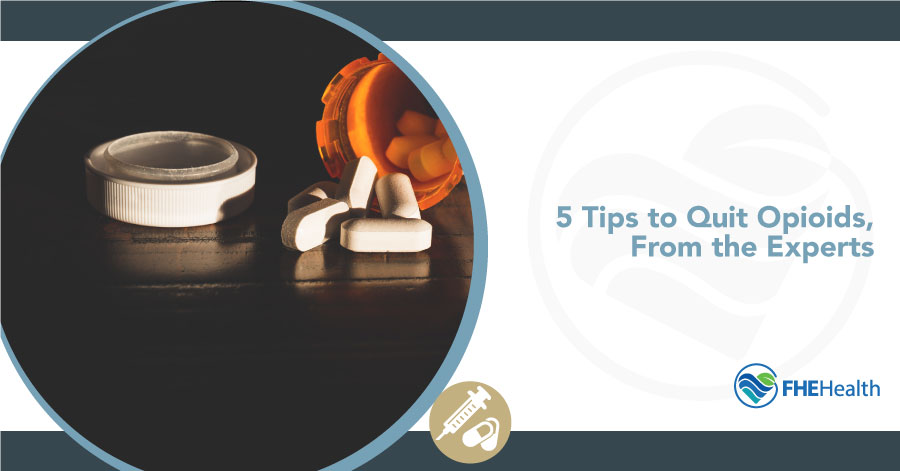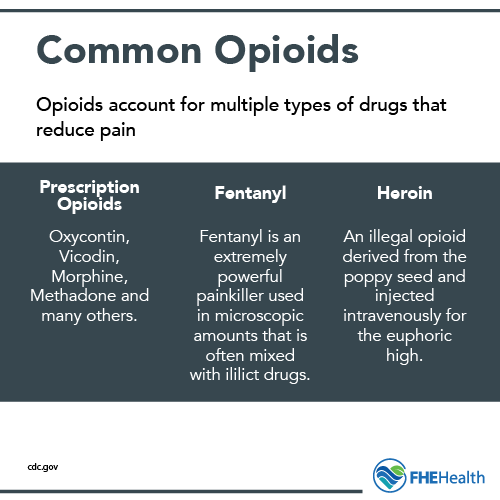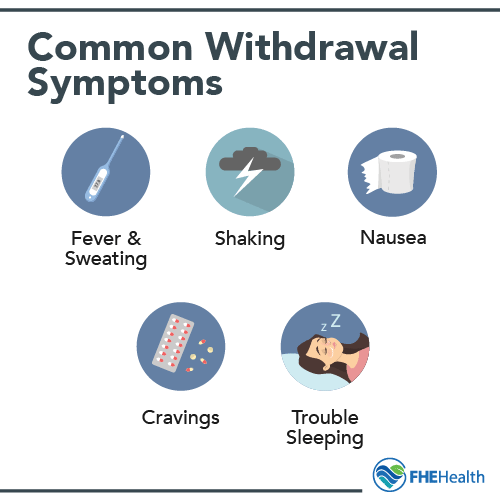
Opioid addiction is a long-lasting and chronic disease. This addiction can lead to social, health and economic problems.
Normally, people start taking opiates for pain, but you may be someone looking for tips on how to quit opiates. This class of drugs is designed to elicit feelings of pain relief and pleasure, so they are good at targeting pain, particularly in those with chronic pain conditions. Some commonly prescribed opiates include:
- Oxycodone
- Methadone
- Codeine
- Morphine
- Buprenorphine
- Fentanyl
All of these opiates are available by prescription or in a hospital setting, and they are recognized for their importance for medical use.
Any of these drugs can be illicit when procured or used illegally, but the most common illicit opioid is heroin. Heroin is an illicit, Schedule I drug. It does not have a recognized medical use.
All of these opioids have the potential to cause addiction. Even when they’re taken as directed, dependency and addiction could occur. Why? Opioids change the chemistry of the brain and cause drug tolerance. Over time, the dosage that you need has to be increased if you want the same effects. This can lead to addiction, the possibility of overdoses and withdrawal symptoms when decreasing the use of the drug.
Signs That You or Someone You Love Is Struggling With Opioid Abuse
Over 90 Americans die every day as a result of opioid overdoses, according to the National Institute on Drug Abuse. If you or someone you love is struggling with opioid abuse or are trying to quit opiates, there will be signs.
Some signs include:
- Running out of prescription drugs before you should
- Mixing with new groups of people or changing friends to those who accept your opioid use
- Losing interest in activities you once loved
- Being tired or sad
- Mood changes
- Missing important appointments
- Struggling with work or schooling
- Not taking care of yourself
- Avoiding time with your friends or family
- Nervousness
- Crankiness
- Being overly energetic
These are just a few signs that you may have an addiction. These are common ways that behaviors change in those who are experiencing addictions of all types.
You may also have opioid withdrawal symptoms if you are addicted or dependent on these drugs. Some signs include:
- Diarrhea
- Vomiting
- Feeling cold
- Irritability
- Abdominal pain
- Tremors
- Drug cravings
- Insomnia
If you are struggling with signs of withdrawal, it’s important to note that they may last up to 10 days, according to the American Society of Addiction Medicine. Quitting without a monitored taper program is not advised. Don’t quit opiate cold turkey because it could lead to life-threatening withdrawal symptoms.

What Are the Benefits of Stopping the Use of Opiates?
Stopping the use of opiates has many benefits. For one thing, quitting helps your brain chemistry adjust to life without the drug. Over time, your cravings will become less and less.
Another major benefit is that you may see a change in your behavior toward the positive. If you were lying, stealing or otherwise taking part in dangerous activities to feed your addiction, you’ll have the opportunity to see clearly and to stop taking part in those actions.
Finally, you may be able to spend more time with friends and family members who have your best interests at heart, and you’ll be able to spend your time doing things you enjoy instead of being high on drugs.
What Are the Best Ways to Stop Smoking Opiates?
Smoking cessation can be difficult no matter what kind of substance you’re smoking. With opiates, there is usually a lower chance of overdose with smoking, which is why people tend to like it. If you smoke, you may find that it’s hard to break the habit, but there are ways to do it.
Quitting smoking has to be a behavioral change. Good nutrition is one great way to help reduce your cravings and to get your mind off the need to smoke. You may also want to consider finding something else to do with your hands and mouth, such as writing or chewing gum. Working with a substance abuse counselor can also help you because they can put you on a safe taper program with low-dose opiates that will eliminate the risk of withdrawal symptoms.
5 Tips to Quit Using Opiates
Is quitting opiates hard? That depends on your willingness to stop taking them. If you are ready to quit using opiates, you may be unsure of how to move forward. Some tips we have for you include to:
- Mentally prepare yourself to quit taking opiates.
- Before you can quit any drug, you need to commit to quitting. Mentally prepare yourself and be sure that you’re ready. Once you decide that you’re quitting, stick to your decision.
- Learn about the potential withdrawal symptoms.
- Learn about recognizing withdrawal symptoms, so you know if and when you need medical support to quit.
- Call a drug helpline.
- If you aren’t sure about how to get off the opiates you’re using, getting good advice is a great tip. Call your local drug hotline, and they will talk to you about your addiction and the steps to take to get clean.
- Go to an addiction treatment group for group therapy locally.
- Many drug addiction groups gather in local community centers and churches. You may want to attend a meeting to see others who are going through what you are and to learn from what works for them.
- Call an opioid addiction treatment facility for firm support during recovery.
- Work with an addiction treatment facility if you want support during recovery. Safe, effective tapering of opioids is one of the best ways to eliminate your dependency on the drugs.
 How Do You Dispose of Opiates?
How Do You Dispose of Opiates?
If you have opiates in your possession, the best way to dispose of them is to take them to a local pharmacy. Any unwanted pills or liquids should go to a “take back” program. You may also be able to give them up at a local DEA-authorized collection site, the local police station or in a pharmacy’s secure drop-box.
It’s not advisable to flush opiates or to throw them out in the trash. Both of those methods can contaminate the environment, which isn’t good for the water supply or the earth.
Get Help When You Need It From FHE
At FHE, we know that it isn’t always easy to make a decision that changes your life. Change is difficult, but we can be there to help you the entire time. If you’re ready to stop using opiate drugs, we’re here to help. Call us at (833) 596-3502 for more information on how to quit opiates today.






